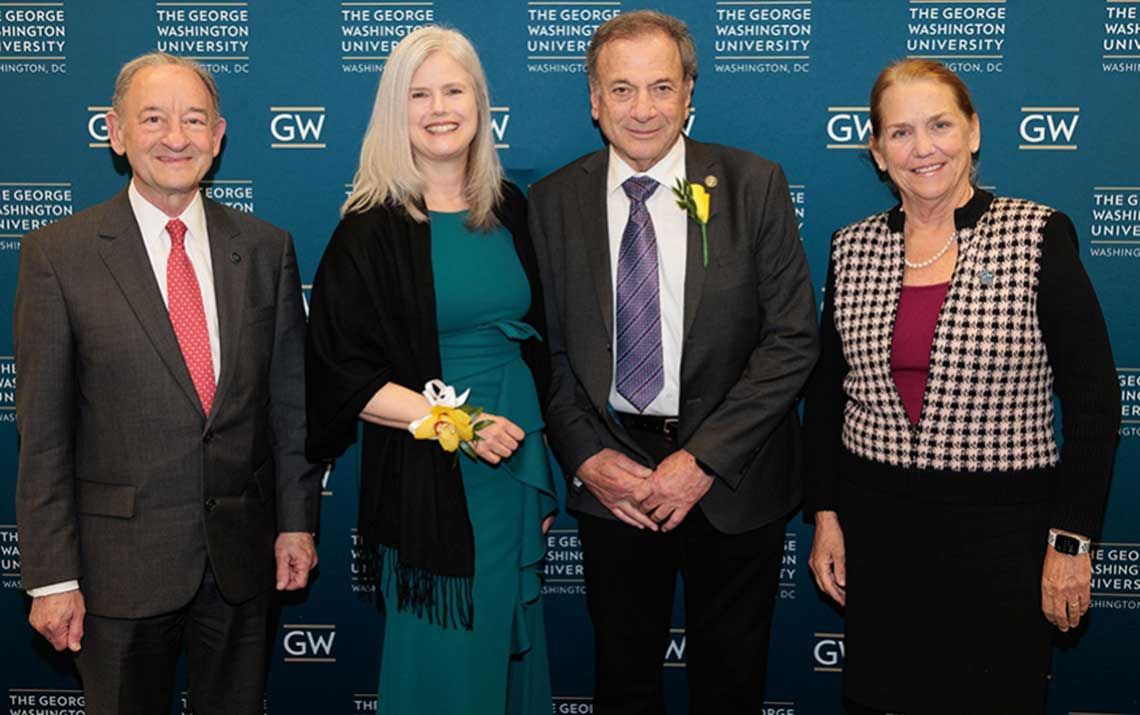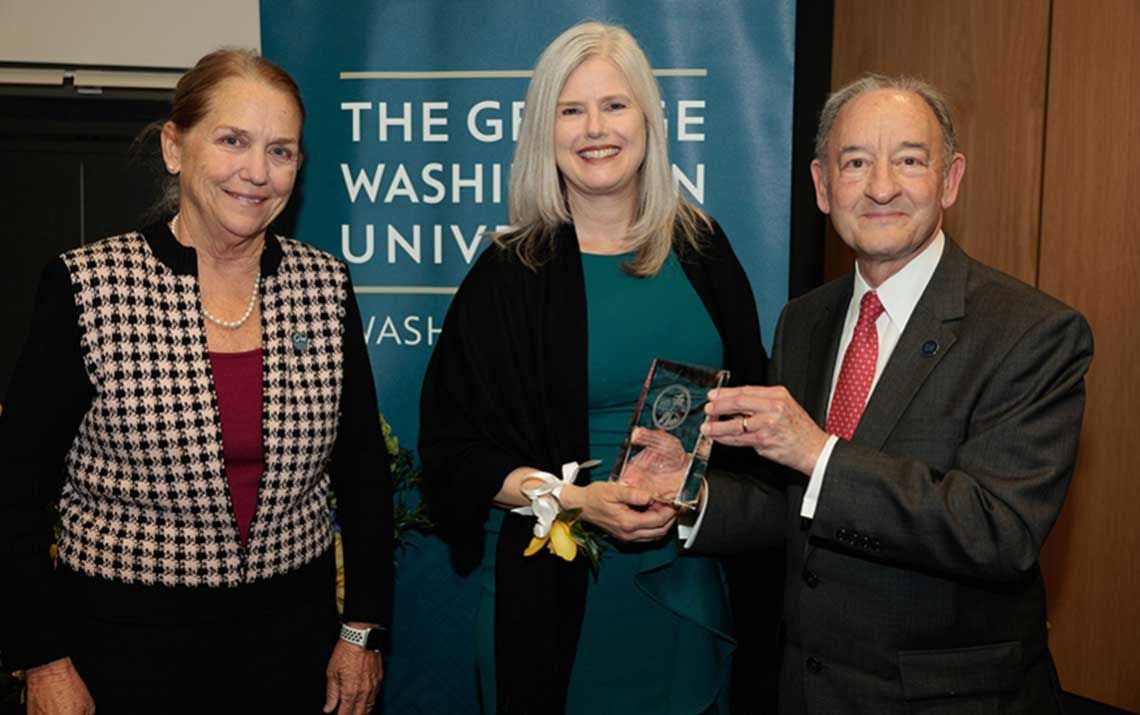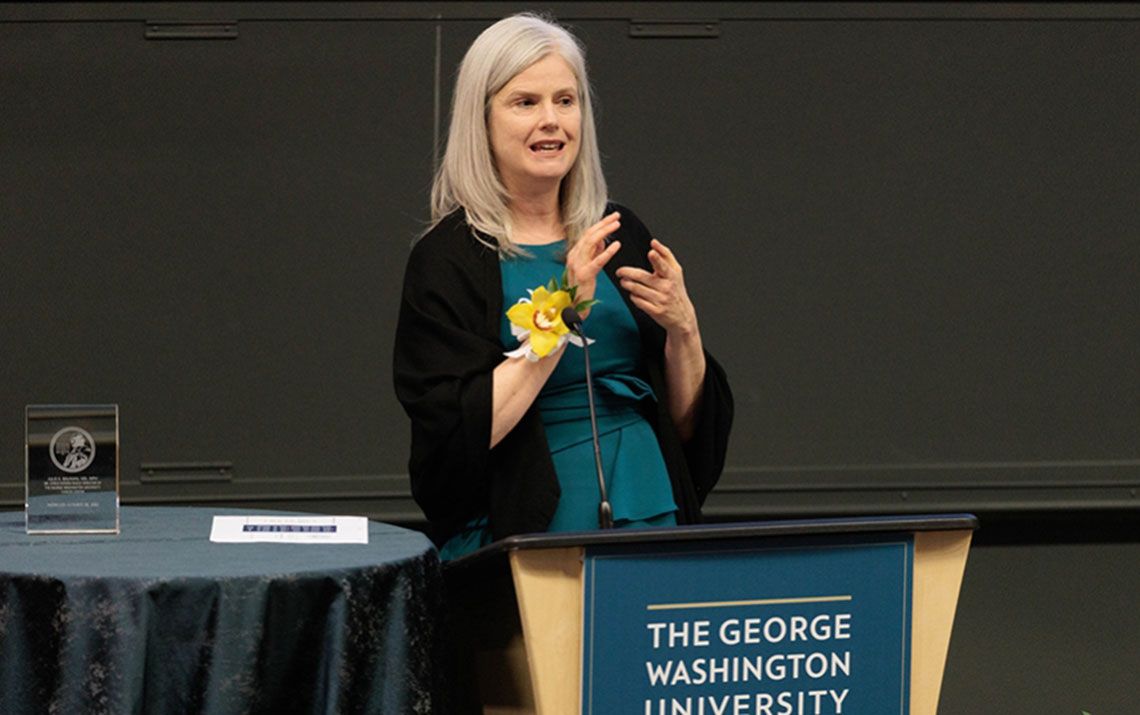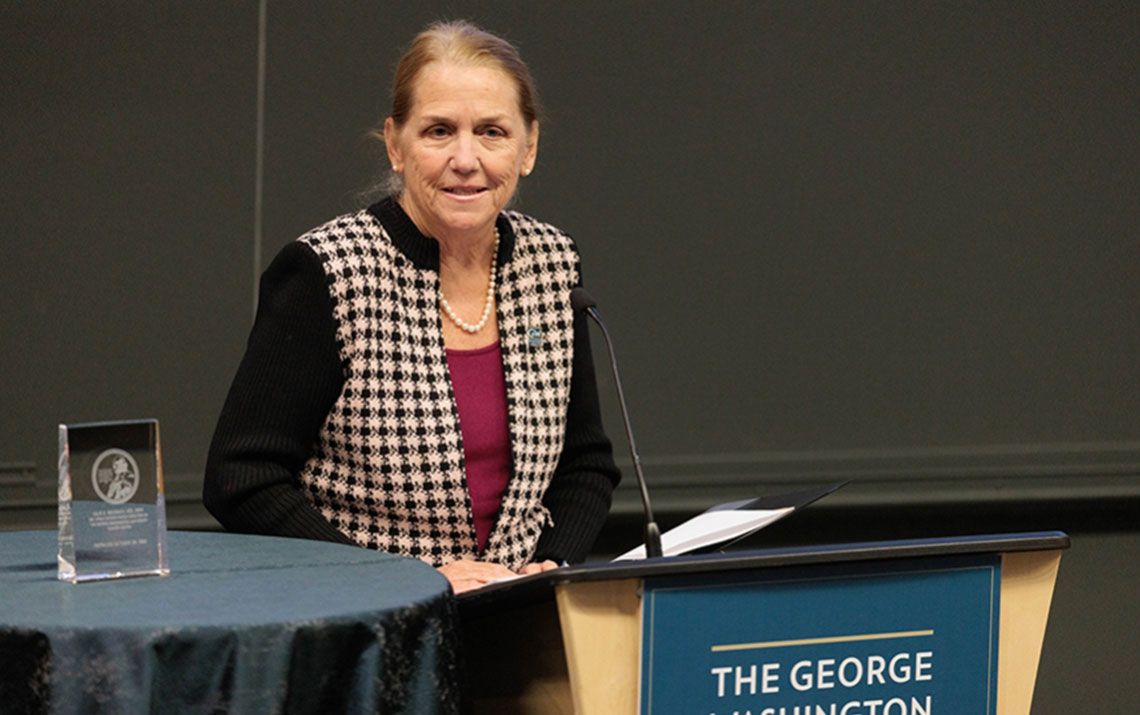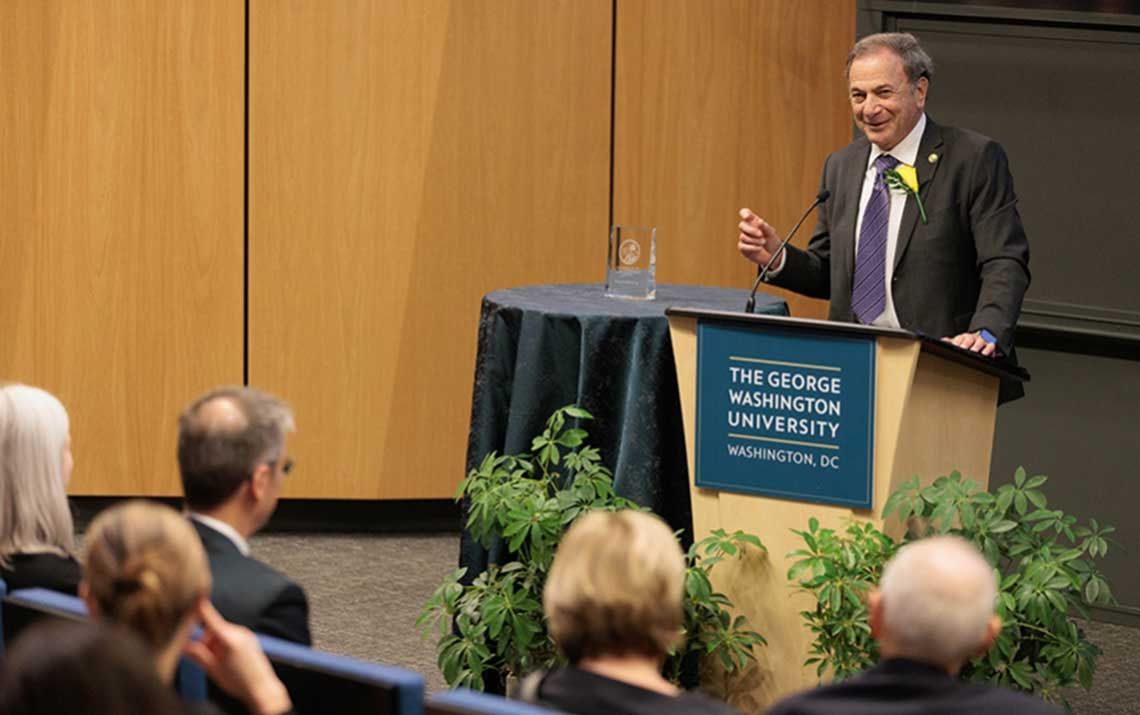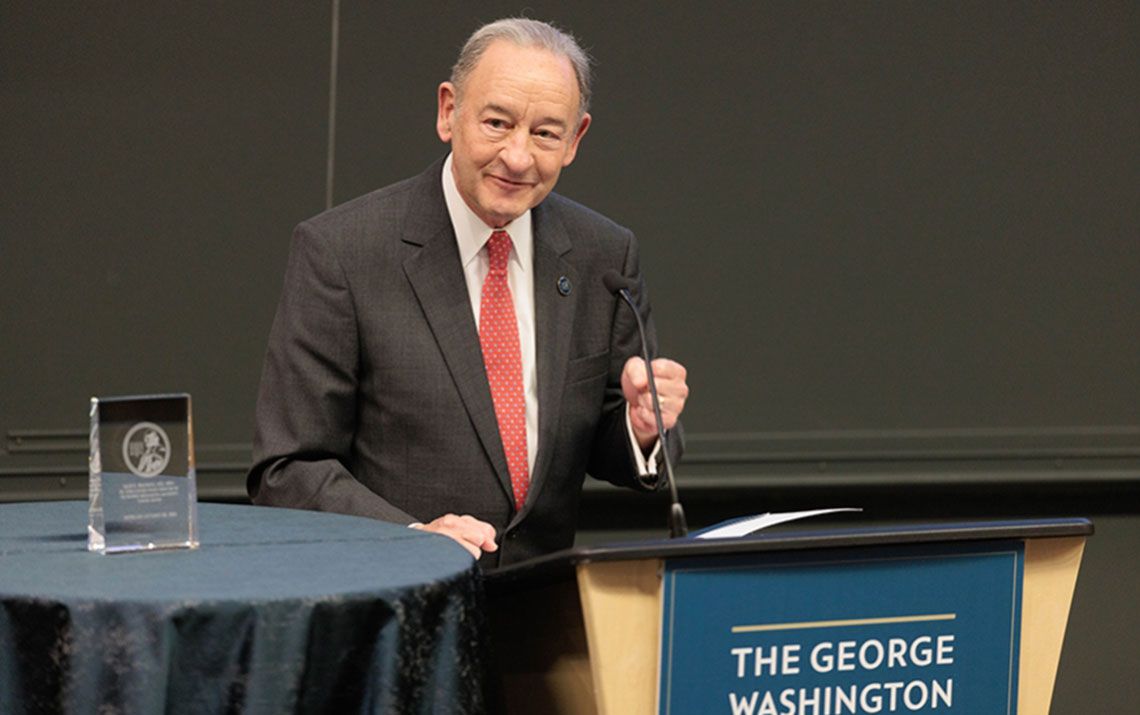Julie E. Bauman, MD, MPH, director of the GW Cancer Center, associate dean of cancer and professor of medicine at the George Washington University (GW) School of Medicine and Health Sciences (SMHS) described the twin pillars of her research and briefly laid out a plan for the GW Cancer Center during her installation as the Dr. Cyrus Katzen Family Director of the GW Cancer Center.
“[Julie Bauman] brings a great vision for the city, our community, and she is committed to our ambition to eliminate cancer as a threat and often tragic for our nation and beyond,” said Barbara L. Bass, MD, RESD ’86, professor of surgery, Bloedorn Chair of Administrative Medicine, vice president for health affairs, dean of the SMHS, and CEO of The GW Medical Faculty Associates. “There’s no question that we have a visionary leader who is already starting to transform and to invigorate our cancer center in a really exciting way to serve our patients and expand and build our scientific and clinical teams that will bring true excellence to our cancer center and the people we serve.”
GW President Mark S. Wrighton, PhD, noted that in his first week at the university, he “underscored to the faculty and executive committee that we should work to develop programs of treatment, research, prevention and education about cancer.”
“I have learned, in my now long life,” Wrighton said, “that everyone is going to be adversely affected by cancer at some point. Either you yourself, a family member, a friend, everyone is affected by cancer.”
It’s been a whirlwind seven months since Bauman arrived in March 2022 from the University of Arizona (AU) College of Medicine-Tucson. She has served as keynote speaker for the Class of 2026 White Coat Ceremony and delivered the 11th Annual Frank N. Miller Lecture, and now becomes only the second person to hold the title of Dr. Cyrus Katzen Family Director of the GW Cancer Center.
The child of physician-parents working in the U.S. Public Health Service, Bauman was born in an Inuit village in Alaska and grew up on Indian reservations across the southwest where her physician-parents cared for medically underserved populations. The firsthand exposure to health disparities imbued a deep regard for human connections, and the mission to provide access to health care and address unmet needs.
Establishing a Firm Foundation
The Dr. Cyrus Katzen Family Foundation established the endowment in 2019 to support the ongoing growth and expansion of the GW Cancer Center in strategic areas of clinical care, research, and education. The Katzen Family Director supports, among other things, basic science and translational research, new treatment protocols, and academic needs for medical students and clinicians.
Jay E. Katzen, MD ’72, BA ’67, director of the Dr. Cyrus Katzen Family Foundation, Inc., and a member of the SMHS Dean’s Council, welcomed Bauman to GW and congratulated her on this next step in her career. “She is certainly one of the country's top cancer physician researchers, and her recruitment to this position is a great step for building the cancer center into a world class institute for cancer research, education and cancer care,” he said.
“My parents, both my parents actually, died from cancer. My family has a long history of cancer. I’m a survivor three times,” added Katzen. “There are, of course, millions of families that suffer from cancer. We want to put an end to this disease, and I think the best way to do this finding a cure is funding research.”
Leadership Credentials
At Arizona Bauman served as professor of medicine, chief of hematology/oncology and medical director of oncology services. She also was the deputy director of the UA Comprehensive Cancer Center and co-leader of its Clinical and Translational Oncology Program, which brings together basic and clinical scientists to transform scientific discoveries into clinical applications.
“She has jumped right into building new teams and new systems to deliver our cancer services and research portfolio more broadly here at GW,” said Bass, adding that since she arrived in March, Bauman has already begun building on a solid foundation of basic science research, enroute to preparing the center for a bid to earn National Cancer Institute designation as a Comprehensive Cancer Center.
Addressing Cancer from Two Directions: Treatment and Prevention
In her address, Bauman touched on her two areas central to cancer research, treatment and prevention. As a medical oncologist — cancer specialist who uses treatments such as chemotherapy, targeted therapy, immunotherapy — she employs innovative therapies to address the most advanced forms of head and neck cancer.
“This is the cancer that affects the lining of the mouth and throat from the lips to the voice box,” Bauman explained, adding that the cancer and its treatment can often lead to devastating effects on critical functions such as swallowing and breathing, as well as more personal acts such as speaking, facial expressions, and kissing. “It is a very high burden in cancer.”
Bauman offered a pair of examples of the promise her research can offer patients, as well as the challenges that lay ahead. Barbara and Molly, she explained, were patients of hers with advanced cancers, who each had already been treated with surgery, chemotherapy, and radiation, and had relapsed within months. Both were out of options when Bauman met them.
“Barbara is a blue-collar worker who developed oral cancer in her 60s, as a former smoker. Molly is a woman in her 30s, who had just completed law school, had her first baby, and was not a smoker but had the lungs of someone who had smoked several packs a day,” Bauman said. “They both developed oral cancer. Both of them were treated in clinical trials that required the dissection and analysis of the molecular genetics characteristics of their cancer.
Barbara, continued Bauman, was the first patient on a clinical trial of the monoclonal antibodies and has been in remission since 2008. Molly, she said, was treated with immunotherapy, using a personalized cancer vaccine against the unique mutations in her individual cancer, a vaccine manufactured just in time for her. She also entered a remission.
“To me, on some days, they seem like miracles,” Bauman told the audience. “The reality is those outcomes are rare, and they are built upon decades of painstakingly slow and often unsuccessful research. Only about 20% of people with cancer respond to immunotherapy, and that is exactly 80% too few, in my view.”
Turning to the prevention side, Bauman wondered, what if Barbara and Molly never developed oral cancer in the first place? Her research in the prevention sphere focuses on developing therapeutics in prevention space work using phytochemicals extracts — compounds produced by plants to help them resist bacteria and disease. The phytochemical sulforaphane — found in broccoli sprouts and other cruciferous vegetables such as Brussel sprouts, kale, cabbage, cauliflower — could stimulate the detoxification of very specific carcinogens found in air pollution, according to Bauman.
She recently published a study looking at broccoli seed and sprout extracts in otherwise healthy people who use combustible tobacco. “It showed,” she explained, “that use of this prevention strategy enhanced the detoxification of some nasty carcinogens; benzene, acrolein, formaldehyde. These are also common carcinogens to pollution, to toxic burn pits, and to fires.”
An Agenda for the Future
Bauman then addressed her vision for leading the GW Cancer Center to NCI Comprehensive Cancer Center designation.
“My joy and privilege is to build patient-centered, modern, multidisciplinary oncology care with clinical research woven into the very fabric of what we do, so that our science touches our patients,” she said. “This is recognition of the full arc of transdisciplinary research going from the bench to patients and to communities.”
She explained that the foundation for NCI-designation starts with basic scientists unraveling the mechanisms behind cancer biology, with translational scientists following up to engineer drugs and technologies that can bring those discoveries into the human domain. Population scientists pick out disparities to lead community-based interventions, community outreach and engagement, and clinical scientists complete the circle through clinical trials that bring those discoveries to the patient community.
“I'm going to quote Dr. Jay Katzen, when the family and the foundation first decided to endow the director’s chair,” Bauman concluded. “He made this statement, ‘We’re not alone. There are hundreds of thousands of families that suffer from cancer, and we want to put an end to this disease. Dad gave this gift to GW because he knew that funding research is the only way to find a cure.’ And there is my North Star. That's why I’m at GW Cancer Center.”
For those who weren't able to attend the event, a recording of the program is available to view.
